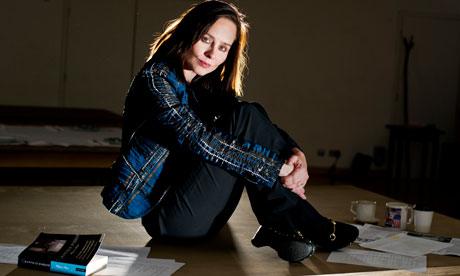I went for a haircut yesterday. I seem to have arrived at the point in life where I have a Stylist. I'm not sure if that is a consequence of age or income. Her name is Louise. She likes the fact that I'm a writer and a "creative"; it's what we talk about as she snips away. Yesterday we discussed artistic failure.
I told her how I always find writing difficult, even though I've been at it for 20 years. Writing fiction is particularly hard, I said. I invest so much time in work that I usually regard as a failure.
It's not that I'm too harsh on myself, I explained. I like some of my stories. Some of them I like a lot. But the problem is, they never turn out how I want them to. I might look on them kindly, but I always see their flaws, their potential for improvement.
 |
| Not my Stylist; it's Tara Fitzgerald |
"It's the artistic temperament," Louise said, snipping away. "Never satisfied."
It could be that, or it could just be that I was having a grumpy day. But I thought about her words again when I read an interview with actress Tara Fitzgerald in the Guardian this morning. Asked, "What does success mean to you?" she replied:
"If you measure success by money, then your achievements are easy to calculate. But if you're a creative person and you measure your achievements by how you feel about yourself, I can't believe you ever feel successful. I just don't think the artistic temperament allows it."
So maybe Louise was right.
Writing about it now, I’m reminded of what Twyla Tharp says in her book, "The Creative Habit". Every creative person has to deal with failure, she argues, because failure is inescapable.
Tharp isn’t one to romanticise failure, but she provides a whole chapter on its benefits. "Believe me," she says, "success is preferable to failure. But there is a therapeutic power to failure. It cleanses."
She then lists six ways a creative person can fail:
Failure of skill. You have an idea in mind, but not the skills to pull it off. "This is the cruellest, crudest, most predictable form of failure,” says Tharp. How do you fix it? Work harder, get the skills you need, she advises.
Failure of concept. You have a bad idea. You keep banging away at it, hoping you can make it work, but you never will. Nobody could. Solution: "Get out while the going's good," says Tharp.
Failure of judgement. You leave something in that you should have taken out, maybe because you ignored your gut feeling, suspended your judgement, tried to please – or not hurt – someone else. Solution: "Remember at all times that you're the one who'll be judged by the final product".
Failure of nerve. This is the worst, she says. "You have everything going for you except the guts to support your idea and explore the concept fully." Solution? "I wish I had a cure for this," says Tharp.
Failure of repetition. Don't cling to your past successes. "Constant reminders of the things that worked inhibit us from trying something bold and new". Solution: follow you instincts and passions, wherever they might lead.
Failure of denial. A painful one. To protect yourself from the risk of being laughed at, ignored, or rejected, you pretend that the audience doesn't matter. That can be useful, but it leads to failure if you refuse to fix problems on the grounds that nobody else will notice or care. "This is bad denial," says Tharp. "You won't get very far relying on your audience's ignorance." Solution: she doesn't suggest one.
I could list more – failure to focus, failure to finish, failure to even start – but I’d rather think about success for a while instead.
2 comments:
"She knows there's no success like failure,
and that failure is no success at all."
There's generally a Bob Dylan quote to fit a situation. There's also the Bob Dylan situation. Why does he keep touring the world and performing into his seventies? And why does he keep changing even the most familiar of his songs? I certainly don't think it's for the money so perhaps he's trying to ward off his own sense of creative failure.
These are good thoughts, Neil, and Twyla hits it bang on. I've learnt far more from my (many) failures than from my (not so many) successes - most notably that if you don't listen really hard and really carefully to that creative voice, you've only got yourself to blame.
Post a Comment